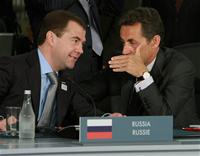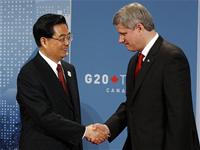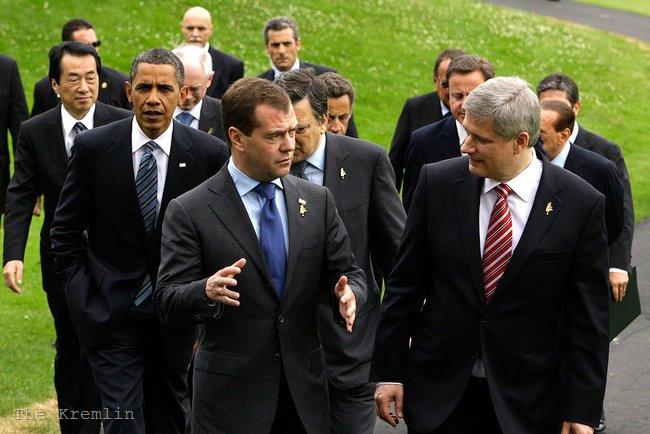G20: balance on the edge of growth
Ralitsa Kovacheva, June 29, 2010
 Contrary to the expectations that the emotions of the football game between England and Germany can stretch the frozen in a deadlock disputes in the G20, this did not happen. The leaders of the 20 most developed economies concluded their meeting in Toronto with a compromise declaration, which reinforces the status quo rather than offering decisions for change.
Contrary to the expectations that the emotions of the football game between England and Germany can stretch the frozen in a deadlock disputes in the G20, this did not happen. The leaders of the 20 most developed economies concluded their meeting in Toronto with a compromise declaration, which reinforces the status quo rather than offering decisions for change.
The document gives much space to the problem of restricting budget deficits, combined with “growth friendly” fiscal consolidation plans". The final text is a compromise between the European insistence on strict budget discipline and the American concern that “synchronized fiscal adjustment across several major  economies could adversely impact the recovery”. (Especially Germany, footnote by euinside)
economies could adversely impact the recovery”. (Especially Germany, footnote by euinside)
At the same time, however, “there is also a risk that the failure to implement consolidation where necessary would undermine confidence and hamper growth. Reflecting this balance, advanced economies have committed to fiscal plans that will at least halve deficits by 2013 and stabilize or reduce government debt-to-GDP ratios by 2016.”
 According to the declaration, advanced deficit countries should take actions to boost national savings while maintaining open markets and enhancing export competitiveness. And the surplus economies will undertake reforms to reduce their reliance on external demand and focus more on domestic sources of growth. All these engagements are being taken with the explicit clarification, that the “measures will need to be implemented at the national level and will need to be tailored to individual country circumstances.”
According to the declaration, advanced deficit countries should take actions to boost national savings while maintaining open markets and enhancing export competitiveness. And the surplus economies will undertake reforms to reduce their reliance on external demand and focus more on domestic sources of growth. All these engagements are being taken with the explicit clarification, that the “measures will need to be implemented at the national level and will need to be tailored to individual country circumstances.”
The language of compromise reaches true perfection in terms of one of the most contentious issues - financial sector reform. As regards the imposition of a global bank levy, the opinion of the leaders repeats finance ministers' position, expressed a month ago, that such a decision must be taken at national level. This was one of the main demands of the European Union, which  has taken a similar decision at its latest Council and individual Member States have already introduced unilaterally bank levies, based on various principles. The United States are also working on the issue. Other countries, however, such as Canada, India and Australia, explicitly refused to "punish" their banks, which, they say, have done well during the crisis.
has taken a similar decision at its latest Council and individual Member States have already introduced unilaterally bank levies, based on various principles. The United States are also working on the issue. Other countries, however, such as Canada, India and Australia, explicitly refused to "punish" their banks, which, they say, have done well during the crisis.
There's a feeling of a retreat also on the issue of tighter capital requirements for banks. On the one hand, leaders are committed to reach a final agreement at their meeting in Seoul in the autumn, and new requirements to be implemented by the end of 2012. On the other had, however, is noted, that “phase-in arrangements will reflect different national starting points and circumstances, with initial variance around the new standards narrowing over time as countries converge to the new global standard”. Global media quoted experts who predicted a delay of the new standard to the distant future.
 The truth is that the crisis which severely affected the developed countries, gave a strong impetus to the developing ones to go much forward. And now they want to benefit from this possibility in the utmost. At the same time, the first signs of growth have weakened efforts for tighter regulation and new financial burdens on the financial sector. It is also true, however, that this balance on the edge of growth cannot continue indefinitely and a choice must be made. And it can only be triggered in the direction of synchronized, common, global actions. Otherwise, some will always benefit from the weakness of others.
The truth is that the crisis which severely affected the developed countries, gave a strong impetus to the developing ones to go much forward. And now they want to benefit from this possibility in the utmost. At the same time, the first signs of growth have weakened efforts for tighter regulation and new financial burdens on the financial sector. It is also true, however, that this balance on the edge of growth cannot continue indefinitely and a choice must be made. And it can only be triggered in the direction of synchronized, common, global actions. Otherwise, some will always benefit from the weakness of others.
 | © European Union
| © European Union | © European Union
| © European Union | © European Union
| © European Union | © The Kremlin
| © The Kremlin